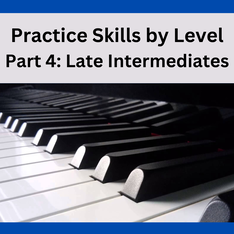
Today's post is the final installment in a four-part series on teaching practice skills to students at each level of their development. You can read part one (beginners) HERE , part two (late beginners) HERE, and part three (early intermediates) HERE.
Today's article is all about practice skills for late intermediate students (and beyond)! Keep reading to see more...
Once students reach the late intermediate level, they are usually comfortable playing music from the standard classical repertoire (easier pieces by Bach, Beethoven, Chopin, etc.). At this level, students can also usually handle most "piano-vocal-guitar" pop pieces--the standard format that is typically available from music stores when you search for popular music.
This is also the level I typically find most of my students achieving right around the time they are approaching the end of their high school years. For this reason, my teaching strategy for students at this level is to focus on self-sufficiency. In other words, I want to equip my students with the tools they will need to make music for the rest of their lives, even after they move on from formal piano lessons!
Here are my top tips for helping students at this level become self-sufficient musicians:
1. Continue building each student’s “practice toolbox” with strategies they can use for a lifetime.
In my previous blog posts linked above, I've talked about some of the practice strategies I use with my less advanced students. With students at the late intermediate level, we continue to work on ways to 1) identify the potential technical challenges in a piece of music, and 2) problem-solve for how best to approach these challenges. This way, each new piece we work on together becomes an opportunity to expand our student's toolbox of practice skills.
When starting a new piece, encourage students to make a list of the challenges they see in the music. This could include anything from counting tricky rhythms, to playing octaves, to playing at a fast tempo. Then, help students brainstorm specific ways to practice that would address each of these challenges. By going through this process, you'll be equipping students with skills that will help them to practice independently for years to come!
2. Give students opportunities to practice a variety of musicianship skills, including sight-reading, harmonizing, improvising, and playing by ear.
I think one of the most important gifts we can give to our students is to make sure they not only know how to read sheet music, but also how to create music away from the written page. By regularly incorporating activities like improvising, composing, playing from lead sheets, and playing by ear, we can make sure that our students are equipped with skills that will help them continue to enjoy music of all types for the rest of their lives.
Looking for activities like these to incorporate into your lessons? Check out my Free Stuff page as well as my "Musicianship Monthly" archives for ideas!
3. Teach students how to find good quality sheet music and good recordings.
If we want our students to continue to play quality music after their time with us, it is important that we teach them how to find quality sheet music and recordings! This includes:
- Guiding students towards music that is at the appropriate level and is well-edited.
- Introducing your students to local music stores in your area. (This a great opportunity for a "field trip" with several of your more advanced students!)
- Showing students where to purchase legally-licensed arrangements of popular music and teaching them the importance of following copyright law.
- Introducing your students to some of your favorite pianists/artists and where to find recordings they have done.
4. Continue to give students opportunities to make music with others.
How will your students use their piano skills in the future? It is very likely that they will one day have the opportunity to accompany their choir at church, be asked to jam with a friend who plays another instrument, or maybe even play a duet with their own children some day!
Help prepare your students for these situations by giving them the opportunity to make music with others now. At this level, your student probably already has a good bit of piano duet experience under their belt, so you might want to consider more advanced ensemble experiences, such as:
- Accompanying the school or church choir for a single piece.
- Accompanying a student who plays another instrument.
- Participating in a chamber music group with several other students.
Not only will these experiences help your students be prepared to make music with others in the future, they will be fun, social experiences that will encourage your students to practice right now!
What do you think? What are your top tips for helping your late intermediate students to become better practicers and self-sufficient musicians? I would love to hear your thoughts in the comments!

 RSS Feed
RSS Feed